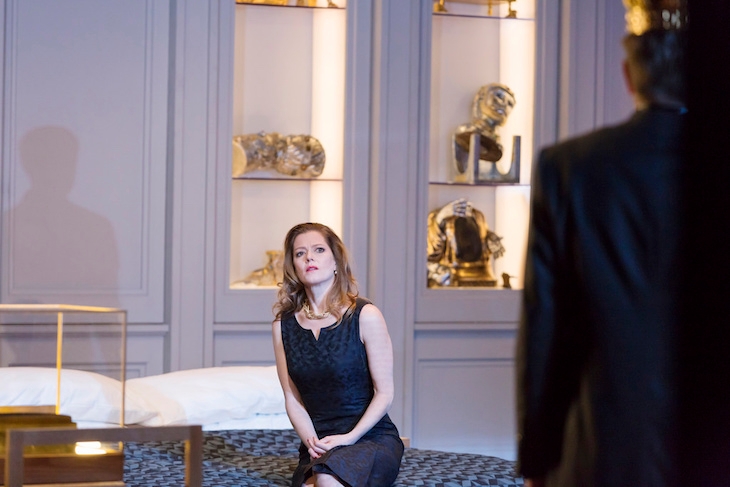There is no such thing as a moderately good performance of Madama Butterfly, or, to be more precise, it’s not possible to be slightly or rather moved by a performance. As with some of Shakespeare’s plays, and most of Wagner’s music-dramas, one is either shaken and overcome, or refrigerated and indifferent. So it’s sad to report that Glyndebourne’s first ever Butterfly, toured in 2016 but now settling on home ground, is a stolid, undistinguished affair, with some decent moments and much that seems routine and a fair amount that is worse than that.
Is it a good idea to update an opera that is set in Nagasaki to the 1950s, when the city was still reeling from the effects of the second atom bomb? Goro’s office and the tattoo parlour opposite seem to have survived; anyway, the office is where Act One is located, making a nonsense of the opening exchanges between Pinkerton and Goro, as well as introducing an element of sleaze that is the opposite of what Puccini intended. The love duet that closes Act One, the composer’s most lovely and tumescent music, should entrance us, while its closing bars should carry a faint but painful warning of the privations and misery ahead. None of that happened at Glyndebourne.
Musically, the main blame for that must fall on the conductor Omer Meir Wellber, whose tempi in Act One were all so leisurely that I wondered whether Pinkerton would ever be granted his night of love. Butterfly’s entry, in particular, the first magical moment in the opera, was both absurdly prolonged and her voice so distant that she was merely not there until suddenly she was. But each silence — there are many in Act One, signalling embarrassment, hesitancy, expectation, change of emotional direction — was merely inert, achieving the opposite of the intended effect.
The best singing and acting came from Michael Sumuel’s Sharpless, who made the most of the moving warning to Pinkerton that Butterfly will take things much more seriously than he will, and the Suzuki of Elizabeth DeShong, aggressively protective of Butterfly, and with a voice suggesting she will soon be singing Erda. The two lead singers have some qualities which suit them for their roles, but they aren’t well directed by Annilese Miskimmon, and have vocal shortcomings. Joshua Guerrero’s B.F. Pinkerton looks the part, but is so obviously a cad and bounder that even Cio-Cio-San wouldn’t be taken in by him, and in the love duet he hectors more than he woos. His best singing is in his brief aria of remorse in the last act. Olga Busuioc’s voice is best in its middle range. Her vocal climaxes were, on the first night, too close to screams, and she doesn’t have the long line that makes Butterfly’s solo passages of resolution and stubborn belief so effective. She was at her best in dialogue, when her acting was also at its most convincing.
No one on stage was helped by the setting of Act Two, with a bemusing number of doors, which gave Kate Pinkerton — surely opera’s most thankless role in its abbreviated Brescia version — the chance to appear and disappear dizzyingly. Butterfly went behind one of them to commit suicide, reappearing so blood-soaked it was amazing that she could get across the stage to give her son Sorrow a final sticky hug. I imagine subsequent performances will improve, but I don’t see that this could ever be a powerful account of a great work.
I’ve been thinking about George Benjamin’s new opera Lessons in Love and Violence and its reception. The atmosphere for its Uraufführung was something I had hardly experienced since Britten’s peak days in Aldeburgh, a wave of adoration so strong that I felt, before it even began, and admittedly after I’d read the programme book of adulatory unction, that it would amount to blasphemy if I weren’t transported bythe piece.
In the event I found its hour and a half somewhat interesting but in no respect the birth of a masterpiece. It sounds as if it had been written and produced for a collection of contemporary sensibilities. Dealing with gay love — though the opening lines warn us not to see it that way — it seems to have a wordy and pretentious text by Martin Crimp, and an economical score that neither clarifies nor enhances the action. Benjamin does have to set lines such as ‘The dull dreams of the average dreamer… burn away in the acid of pure and inexchangeable value’, which can’t be easy, but apart from that there is no warmth in this score, no generosity and, for me, nothing to remember and savour.






Comments